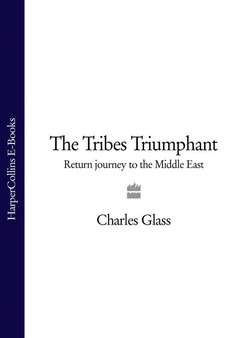Читать книгу The Tribes Triumphant: Return Journey to the Middle East - Charles Glass, Charles Glass - Страница 25
On the West Bank
ОглавлениеINSIDE THE ISRAELI BORDER SHED the old Haj asked me to fill in his forms. At this crossing between an Arab country and occupied Arab land, there were no Arabic entry cards. All were in Hebrew and English. The old man gave me his and his wife’s Jordanian passports and I wrote their names and addresses on the questionnaire. He was born in 1932. City of birth: Bethlehem. I hesitated at country, wanting not to complicate his entry, before writing what it said in the passport: Palestine. The purpose of their visit was to see their daughter. They thanked me and went ahead to the passport booth, where a young policewoman was polite to them both. The man laughed at something she said and then, taking his wife’s hand and wheeling his smart new suitcase, walked outside to a taxi.
Next at the passport counter came the man in the suit. After presenting his American passport, he answered the policewoman’s questions in an amiable but apprehensive way. Born in the West Bank in 1960, he now worked as a businessman in Jordan. The purpose of his visit was to see business associates in Jerusalem. Unfortunately, his passport had stamps from many trips to Europe. The Israelis took him apart, first the suitcases, then his dignity. Israeli police did not treat American citizens of Arab origin as they did other Americans. They looked on them as security risks. This man would have a hard time. I had done a story the year before about another Arab American, a young man named Anwar Mohammed, from Florida. The police had arrested him as he was leaving via this same border. They took him to the Moscobieh, the security headquarters in Jerusalem known in English as the Russian Compound. He was chained to a chair, interrogated, abused, held for two months and released without charge. He was lucky, saved perhaps by the cockiness that came from his youth, his karate black belt, his belief in his American passport and, just as important, the fact that there was no evidence against him. If he had been a Palestinian with no passport, only a refugee identity card, he might have stayed for years. The American Embassy lodged no protests on his behalf. An American diplomat pointed to a warning on the State Department website that Israel did not necessarily respect the American citizenship of Arabs born in Arab countries, Israel or the occupied territories. The State Department permitted the Israeli police to determine who was and who was not an American citizen.
Outside, in the dark car park, I found an Israeli taxi driver and asked him to take me to Jerusalem. The road from the Allenby – Hussein Bridge cut through the occupied – disputed Jordan Valley, knocking aside all obstacles in its straight path. Jericho, whose walls came tumbling down, sparkled on the dark horizon. ‘That her walls fell at the sound of Joshua’s trumpet,’ the Reverend George Adam Smith wrote in 1894, ‘is a summary of her history.’ No one had ever defended Jericho. Her low-lying position on the frontier between eastern desert and western mountain was indefensible and prey to raiders from both directions. Under the Oslo accords of 1993, Jericho was the first town that Israel allowed the new Palestinian administration to govern for itself, within limits.
As the road had created its way through the plain, it resculpted the hills beyond. On the Jordanian side, it had rambled with the land like the rolling English road’s drunken path of no resistance. Israel’s was an American highway for which mountains and villages and forests made way, a proud, broad road that would have me in Jerusalem for dinner. ‘There is no water,’ Reverend Smith wrote, ‘from Jericho till you reach the roots of the Mount of Olives.’ There was no traffic either. Israeli settlers were afraid to drive at night, and the Israeli army kept the Palestinians confined to their towns.
